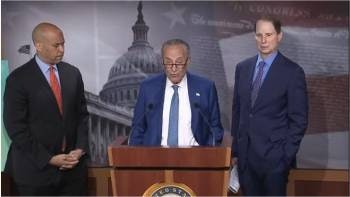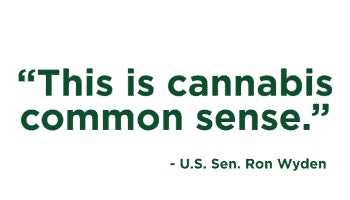
The Democrats’ majority in the U.S. Senate isn’t getting any younger this Congress, but a trio of proponents behind cannabis reform have remained gradual in kickstarting their efforts. Their pace picked up July 14.
Senate Majority Leader Chuck Schumer, D-N.Y., Senate Finance Committee Chairman Ron Wyden, D-Ore., and Sen. Cory Booker, D-N.J., unveiled a preliminary draft of a federal cannabis legalization bill they plan to formally introduce later this year.
The 163-page Cannabis Administration and Opportunity Act (CAOA) aims to remove cannabis from the list of controlled substances; tax and regulate cannabis at the federal level; and grant states the power to keep or administer their own oversight programs.
“This is a bill we’ve consulted the experts; we’ve consulted many of our colleagues,” Schumer said during the July 14 press conference announcing the bill. “And the next step, for this critical legislation, is getting further input from stakeholder groups, which is essential to the legislation’s success. It’s time for the country to engage in this discussion and update our federal laws, not only to reflect popular wisdom, but science—but science.”
The Senate trio issued a joint statement Feb. 1, in which they said ending federal cannabis prohibition is necessary to right the wrongs of the failed war on drugs. In the statement, they said they would release a unified discussion draft on comprehensive reform to ensure restorative justice, protect public health, and implement responsible taxes and regulations.
 schumer wyden booker
schumer wyden bookerWhile Schumer, Wyden and Booker said they’d released a unified discussion draft “in the early part of this year,” they held a press conference July 14 about delivering on that end. They reiterated that the drafted bill they released just prior to the conference is not a final version, and they will consider public input to help fine-tune the legislation through Sept. 1, 2021.
"This is cannabis common sense," Wyden said during the press conference.
Watch the full press conference below.
According to the draft bill’s text:
The attorney general would be required to finalize removing “marihuana and tetrahydrocannabinols [THC]” from the schedule of controlled substances no later than 180 days after the enactment of the act.
A federal cannabis sales tax on any products produced in or imported into the U.S. will be 10% during the first two calendar years following the enactment of the bill, then will rise to 15% in the third year, 20% in the fourth year, and 25% in the fifth year.
The act would transfer agency functions with regard to cannabis from the Drug Enforcement Administration’s (DEA) jurisdiction to the Bureau of Alcohol, Tobacco, Firearms and Explosives (ATF), the Department of Health and Human Services (HHS) and the Department of the Treasury.
Restorative justice measures include the expungement of non-violent federal cannabis offense convictions for individuals not under a criminal sentencing no later than one year after the bill’s enactment. In addition, any individual with a prior conviction or adjudication of juvenile delinquency for a non-violent federal cannabis offense, who is not under a criminal justice sentence, may immediately file a motion to petition a court for expungement.
All cannabis transported across state lines shall, upon arrival, be subject to the operation and effect of the laws of that state. States will retain their rights to continue prohibition measures, if they choose—forbidding out-of-state shipment into their jurisdictions that violate their state laws—while transportation between states with legal cannabis programs will be permitted.
Restorative justice and opportunity trust funds will be reserved for certain reinvestment programs:
A Cannabis Justice Office (within the Office of Justice Programs) will provide eligible entities with funds to administer services—such as job training, reentry support, literacy programs, legal aid, youth recreation and mentoring programs, and health education—for individuals adversely impacted by the war on drugs.
A Cannabis Opportunity Program will provide any eligible state or locality funds to make loans under section 7(m) of the Small Business Act to assist small business concerns owned and controlled by socially and economically disadvantaged individuals who operate in the cannabis industry.
An Equitable Licensing Grant Program will provide any eligible state or locality funds to develop and implement equitable cannabis licensing programs that minimize the barriers to cannabis licensing and employment for individuals adversely impacted by the war on drugs.
With this highly anticipated legislation now landing in Congress, the industry has begun offering its response. By and large, early comments have been cautiously supportive—with much of the reaction underscoring the importance of social equity provisions in the proposal.
"We have been clear from day one that any federal marijuana reform bill must be equally comprehensive to the devastation that has been caused by prohibition, particularly in Black, Latinx and Indigenous communities,” Maritza Perez, Director of the Office of National Affairs at the Drug Policy Alliance, said in a public statement. “And we are grateful to see Senators Booker, Wyden and Schumer heeding that call by including language directly from the MORE Act—centering social equity, reparative justice and reinvestment—that we championed in the House, in the Senate bill, and we look forward to working with them to make marijuana justice a reality this session.”

Striking a similar note, Ben Kovler, founder and CEO of Green Thumb Industries, said, “Cannabis continues to be disproportionately weaponized against communities of color, and we are thrilled that the Cannabis Administration and Opportunity Act has proposed expungement and community reinvestment measures to address the damage perpetuated by the failed war on drugs. While the bill leaves some questions unanswered, we believe it provides a tangible pathway to true federal legalization.”
With language that clearly ties the descheduling of cannabis to the long-running policy failure of the U.S.’s war on drugs, the proposal is widely seen as a chance to forge a new, unified front for the emerging cannabis market. States would retain regulatory oversight, but a federal policy would provide at least some degree of unity across the country.
"While the bill would direct the attorney general to remove cannabis from the Controlled Substances Act, it wouldn’t legalize cannabis everywhere," Jonathan Havens, co-chair of the Cannabis Law Practice and chair of the Food and Beverage Practice at Saul Ewing Arnstein & Lehr, told Cannabis Business Times and Cannabis Dispensary. "Thus, it’s more appropriate to say that the bill would end the federal prohibition on cannabis, rather than legalize it. States would still be able to prohibit cannabis growing, manufacturing, distribution, sale and consumption within their borders. However, they wouldn’t be able to stop transportation of cannabis through their states (e.g., from one legal state to another legal state, via a state where it’s illegal)."
Havens said the CAOA essentially takes a similar approach to the 2018 Farm Bill that ended the federal prohibition on hemp, and would eliminate many obstacles that state-legal cannabis businesses currently face due to cannabis's Schedule I status, such as tax deductions, banking, capital markets and intellectual property issues.
“We applaud the introduction of legislation that would federally decriminalize cannabis,” said Wana Brands CEO Nancy Whiteman in a public statement. “The introduction of legislation that would federally decriminalize cannabis would have implications far beyond banking. For starters, it will expand the opportunities for minority populations that have been disproportionately targeted during the war on drugs. Federal decriminalization would also enable manufacturing and then shipping across state lines, which would greatly benefit brands like Wana. Supply chains will become more efficient and cost-effective as plants would be grown in appropriate outdoor climates and other materials could be sourced across markets. For a company like Wana, it means that we would be able to manufacture and ship out of regional or national facilities instead of recreating the wheel in every market.”
“The introduction of the Cannabis Administration and Opportunity Act is imperative to address the disparate impact of the war on drugs and right the wrongs created by decades of injustices perpetrated by disproportionate enforcement against minorities,” said Joe Caltabiano, CEO of Choice Consolidation Corp. and co-founder of multistate cannabis operator Cresco Labs, in a public statement. “In addition, the opportunity to address safe access to cannabis and robust reforms needed for cannabis banking and tax policy is long overdue.”
As for the bill’s prospects of passing through Congress and being signed into law by President Joe Biden, Caltabiano added, “While this bill is an essential step in the right direction, it is a big ask and I’m a realist. It will take a lot to get this bill through Congress and signed by the president. I remain hopeful and enthusiastic for the passage of the Act, but I believe that even incremental actions such as the passage of the SAFE Banking Act would be a tremendous accomplishment for this Congress and the current administration.”
Havens echoed this sentiment, pointing out that the bill needs 60 votes to pass in the Senate, and it is unclear if all 50 Senate Democrats support the measure, let alone 10 Republicans in that chamber.
"Schumer, Booker and Wyden know the bill is a longshot," Havens said. "My view is that they are introducing it to let the caucus know where they stand, and more importantly, to start the conversation and hopefully pave the way for incremental reform. Given the current makeup of the Senate, incremental reform is much more likely than a sweeping proposal like this. "
Digital Editor Eric Sandy, Senior Digital Editor Melissa Schiller and Assistant Editor Andriana Ruscitto contributed to this report.

























